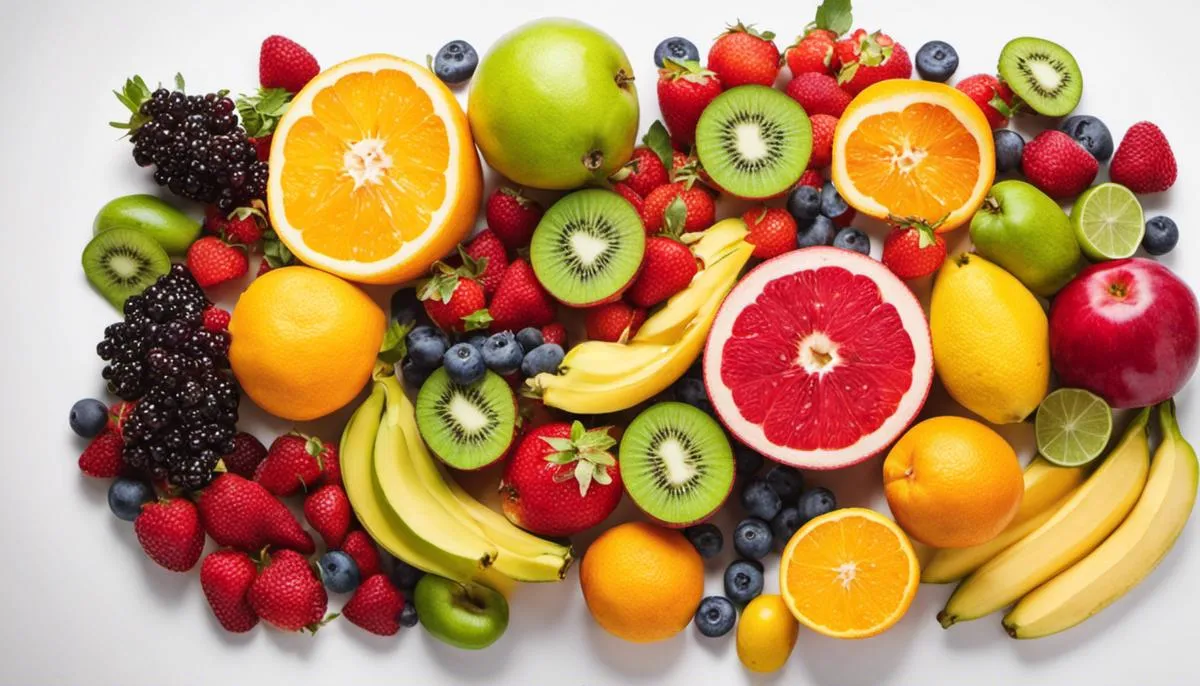Vitamin Water Energy, a widely consumed beverage, is extensively acclaimed for its refreshing taste and energy-boosting properties. Like most energy drinks, it boasts a compelling composition of vitamins, minerals, and a wide assortment of other crucial ingredients uniquely meant to rehydrate and re-energize your body. This analysis seeks to provide an in-depth look at the varied components of Vitamin Water Energy, their potential health benefits, and feasible side effects with an overarching objective of disseminating enlightening insights to guide informed decision-making for consumers. Additionally, this exploration will magnify the fundamental differences and similarities between Vitamin Water Energy and other counterpart energy drinks in regard to nutritional content, flavor, diversity, and cost-effectiveness. Built on factual data, reviews from consumers, comprehensive market analysis, and sales performance, this exposition will encapsulate the authentic standing and growth prospects of Vitamin Water Energy in the bustling beverage market.
Composition of Vitamin Water Energy
Composition of Vitamin Water Energy
Vitamin Water Energy primarily contains a unique blend of essential elements that are required for the body’s optimal functioning. The core components of this energy drink include vitamins, minerals, sugars, natural flavors, and additives, mixed in a specific proportion to ensure the energy needs of the body are met efficiently.
Vitamins
Vitamin Water Energy is packed with essential vitamins such as Vitamin B5 (pantothenic acid), Vitamin B6 (pyridoxine), Vitamin B12 (cobalamin), and Vitamin C (ascorbic acid), which form a significant portion of its composition. Vitamin B is known to convert food into energy, Vitamin B6 aids with brain development and function, and Vitamin B12 helps prevent types of anemia, while Vitamin C is vital for growth, development, and repair of body tissues.
Minerals
While the concentration of minerals in Vitamin Water Energy may vary, most bottles contain modest amounts of potassium and sodium. Potassium helps to balance fluids, send nerve signals, and regulate muscle contractions, while sodium regulates blood volume, blood pressure, and osmotic equilibrium.
Sugars and Natural Flavors
Each bottle of Vitamin Water Energy contains around 23 grams of added sugars, providing the necessary burst of energy during physical activities or when you need an extra boost. The natural flavors in Vitamin Water Energy typically come from plant sources and contribute towards the unique taste and refreshing quality of the drink.
Additives
Vitamin Water Energy also contains additives like electrolytes, designed to support hydration. Other ingredients such as vegetable juice (for color), modified food starch, and glycerol ester of rosin (used to keep oils in suspension in water) are added for structure and appearance. An ingredient called taurine, a type of amino acid, is usually present in energy drinks like Vitamin Water Energy. Research suggests taurine can help with the body’s cognitive functions and athletic performance.
To sum things up, Vitamin Water Energy contains a variety of components designed to provide immediate energy and crucial nutrients to your body. However, one should bear in mind that while Vitamin Water Energy may offer a short-term energy boost, a well-rounded, nutritious diet provides the body with all the necessary nutrients in the right balance. It’s vital to recognize that energy drinks are not a substitute for water, and should not be used as your primary source of hydration or nutrition.
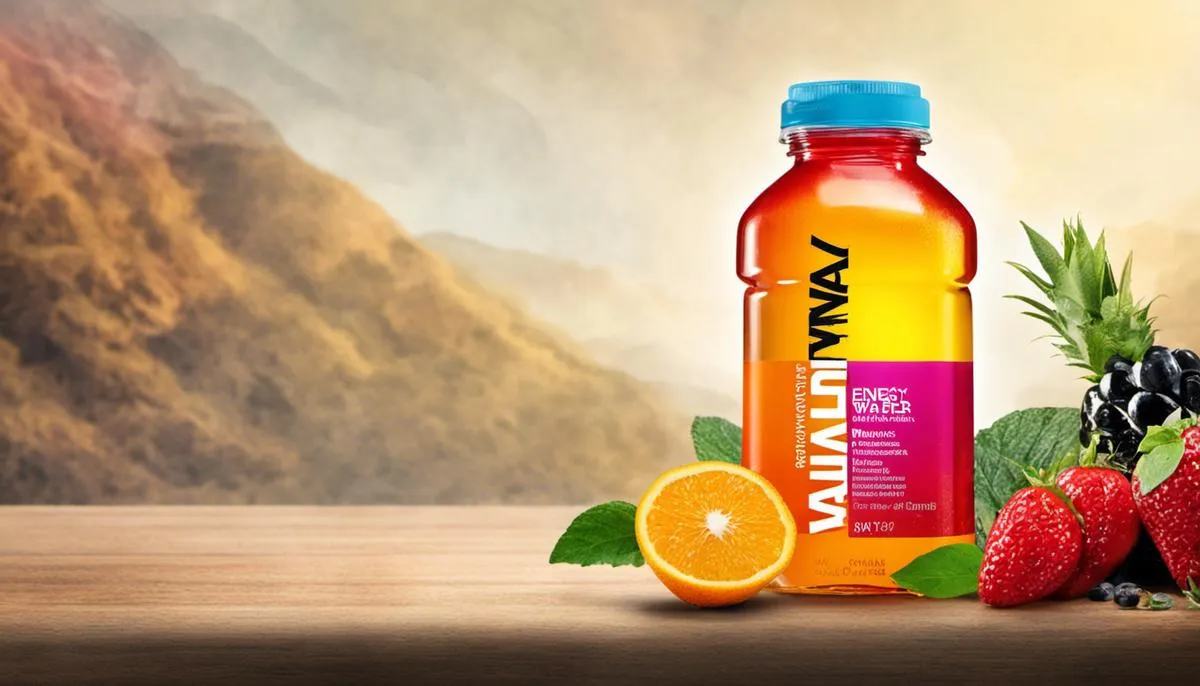
Health Benefits and Side Effects
Vitamin Water Energy: A Closer Look
As one of the choices within the Vitamin Water brand, Vitamin Water Energy offers a low-calorie way to get essential nutrients and an energy boost. Packed with vitamins including B3, B5, B6, B12, and C, as well as electrolytes, this beverage helps support overall health and maintain energy levels. Just remember the earlier note – while a helpful supplement, it’s not a replacement for a well-rounded diet or proper hydration.
Primary Benefits
The primary benefit of consuming Vitamin Water Energy comes from its vitamin content. Vitamin B3, also known as niacin, aids in regulating the nervous system, metabolizing carbohydrates, and maintaining healthy skin. Vitamin B5, or pantothenic acid, is crucial in breaking down fats and carbohydrates for energy and aiding in the production of red blood cells and hormones. Vitamin B6 helps in the creation of neurotransmitters, the body’s chemicals that influence mood and other brain functions. Vitamin B12 plays a major role in the normal functioning of the brain, nervous system, and the formation of blood. Vitamin C, on the other hand, is an antioxidant that fights off harmful free radicals and boosts the immune system.
Electrolytes and Hydration
The electrolytes present in Vitamin Water Energy, such as potassium and magnesium, ensure your body stays hydrated and promotes muscle function. The 50 milligrams of caffeine found in this beverage provide a slight energy boost comparable to about half a cup of coffee.
Potential Side Effects
However, it is important to note some potential side effects of consuming Vitamin Water Energy. If consumed in excess, the sugars present can contribute to weight gain and other health problems like tooth decay and diabetes. Consuming more than the daily recommended intake of certain vitamins and minerals—especially in a short period—can lead to side effects. For instance, excessively high levels of vitamin B3 can cause flushing and liver damage, while high intake of vitamin B6 can cause nerve damage.
Caffeine Content
The presence of caffeine in this product might be a concern for some. Though it provides an energy boost, excessive caffeine consumption can lead to jitteriness, increased heart rate, sleeping problems, and for some, increase digestive problems.
Understanding the Role of Vitamin Water Energy
An integral part of a balanced diet and a healthy lifestyle, Vitamin Water Energy should be used as a supplement to your routine, not as a primary source of nutrition. Thus, your consumption of Vitamin Water Energy should be seen in the context of your overall diet, hydration needs, and energy requirements, complementing your consumption of nutrient-dense whole foods.
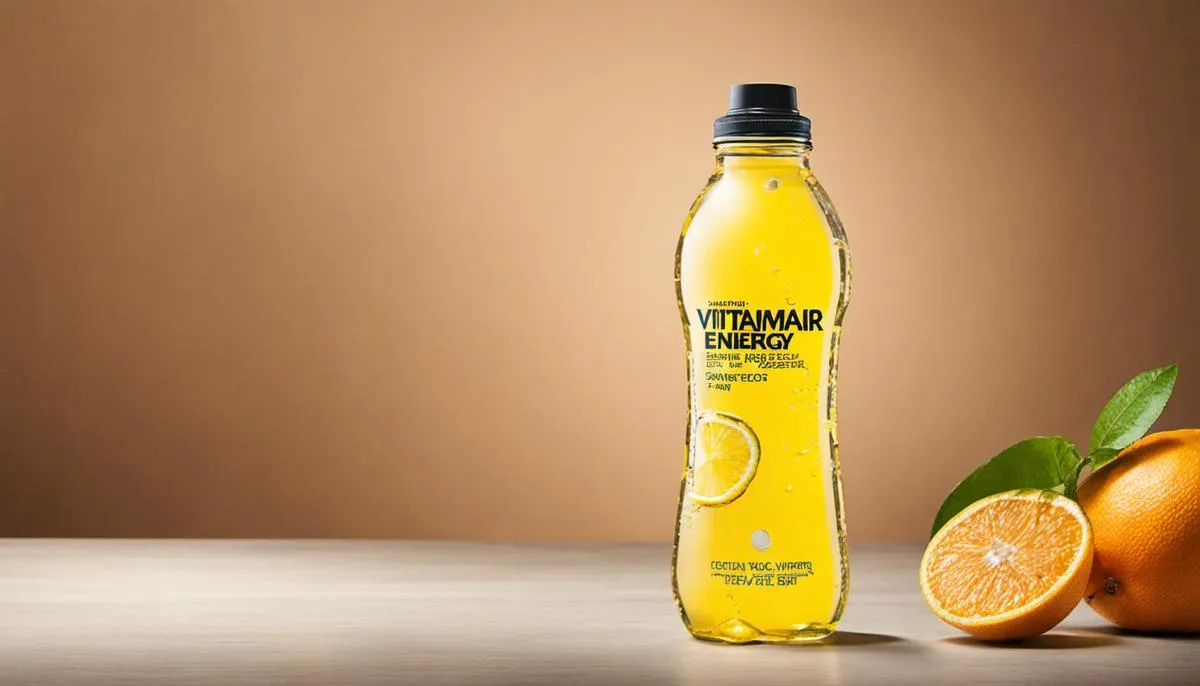
Comparison with Other Energy Drinks
A Comparisons Between Vitamin Water Energy and Other Energy Drinks
Compared to other energy drinks, Vitamin Water Energy provides a robust nutritional profile that appeals to individuals who strive for a healthy lifestyle. It offers 50% of your daily intake of vitamins B3, B5, B6, B12 and C and delivers 80 milligrams of caffeine naturally sourced from green coffee beans. On the other hand, additional energy drinks, such as Red Bull and Monster, provide between 80-160 milligrams of caffeine, typically from synthesized sources, and they tend to have higher levels of sugar. Vitamin Water Energy has 120 calories and 32 grams of sugar per 20 fluid ounces, a similar sugar content to Monster and Red Bull, but it offers a lower caloric intake.
Taste
In terms of taste, vitamin water energy offers a refreshing change from the syrupy and artificial flavors that are often associated with common energy drinks on the market. The vitamin water energy drink comes in three flavors – strawberry lime, tropical citrus, and raspberry vanilla, which are praised for their smooth and enjoyable flavors. On the other hand, Red Bull and Monster often have bold and strong flavors which could potentially be off-putting to some consumers.
Variety
While other conventional energy drinks are available in a range of flavors, vitamin water energy has an edge with its variety of offers. Besides the three exclusive flavors available, it has many sub-brands, each with its own range of flavors, including vitamin water zero versions which have fewer calories and less sugar than their original line.
Cost
When it comes to cost, vitamin water energy is reasonably priced and competitive with other energy drinks. The average price for a bottle of vitamin water energy is about $1 to $1.50, slightly cheaper than a regular-sized can of Red Bull or Monster, which is typically between $2 and $3. Therefore, vitamin water energy appears to be a more cost-effective option for those seeking an energy boost.
Understanding Vitamin Water Energy
Looking beyond the mainstream energy drinks, one finds vitamin water energy – a player that touts its natural ingredient profile, accessible price point, and variety of flavors. An important distinction, however, comes with its sugar content. While boasting nutritional benefits, it shares a comparable sugar content with common energy drinks, a significant consideration for those managing their sugar consumption.
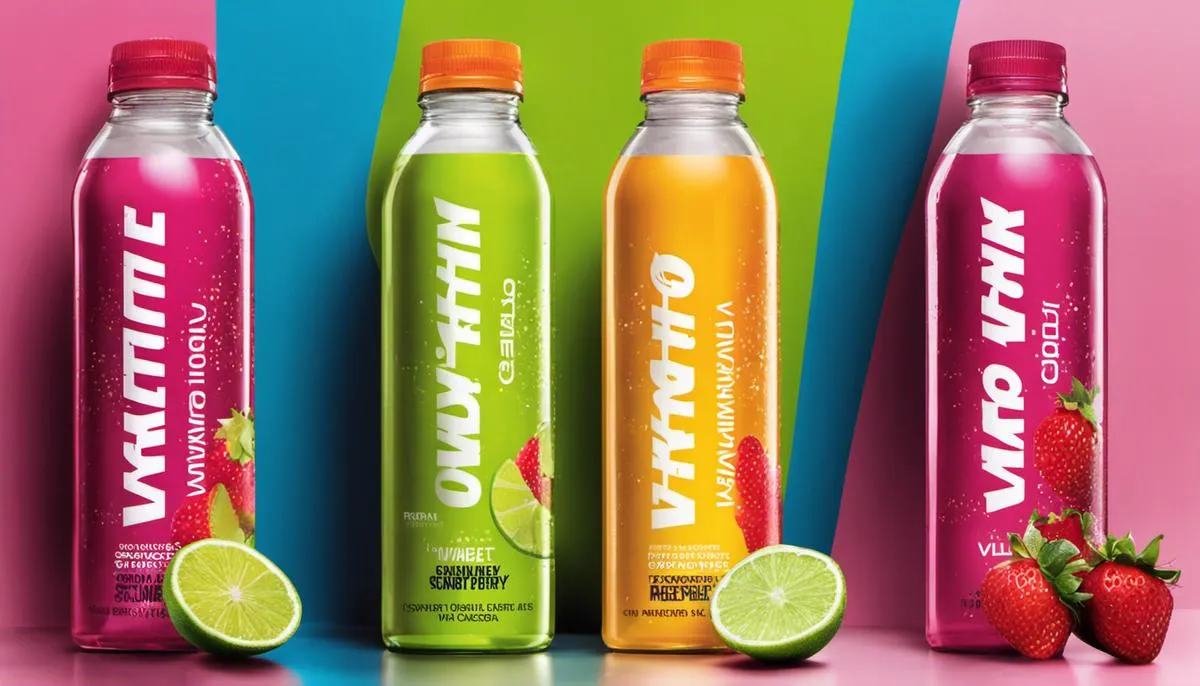
Consumer Reviews and Market Analysis
What Consumers Think
Opinions on Vitamin Water Energy span a broad spectrum, with perceptions diverging based on personal taste and health objectives. Synthesizing online feedback, including remarks left on widely-used platforms like Amazon, a 4.3 out of 5-star rating emerges as the median approval rating.
Consumers speak positively of the drink’s fresh taste and invigorating attributes, positioning it as a healthy swap for traditional caffeinated drinks. The diversity of flavors and the infusion of vitamins – seen as promoters of general health – are other appreciated aspects. Despite the prevailing compliments, a portion of users express disapproval, taking issue with an excessive sweetness and disputing the drink’s claims of energy enhancement.
Sales Data and Popularity
In terms of sales data, Vitamin Water Energy continues to demonstrate strong growth in the sector of health-focused beverages. According to the Beverage Marketing Corporation’s annual report, the vitamin-enhanced water market has grown steadily over the past few years, with Vitamin Water Energy enjoying a reasonable market share.
However, it is important to note that the drink faces stiff competition from other energy-infused beverages and traditional energy drink brands. Despite the challenges, the brand has managed to carve out a niche for health-conscious consumers who avoid sodas and artificial energy drinks.
Growth Potential and Market Projections
When considering the current health and wellness trend, the growth potential of Vitamin Water Energy appears promising. The increasing consumer demand for healthier beverage options presents an opportunity for products like Vitamin Water Energy to gain a larger market share.
Forecast reports from research firms like Mintel and Market Research Future indicate that the global market for vitamin fortified and mineral-enriched foods and beverages is expected to grow significantly. They projected a compound annual growth rate (CAGR) of about 7.6% from 2020 to 2025. These market dynamics coupled with consumer trends towards healthier lifestyle choices make for an environment ripe with potential for Vitamin Water Energy.
Product Innovations and Future Developments
In addition to its established line of products, Vitamin Water continues to innovate by launching new variations of its popular drink to attract and retain customers. Recent additions include beverages boasting extra antioxidants and ones created for specialized functions such as rejuvenation and focus improvement, diversifying their product line to meet a broader range of consumer needs.
Given the increasing awareness and demand for healthful products in the global market, it seems plausible that Vitamin Water Energy will stay relevant and enjoy positive growth for the foreseeable future.
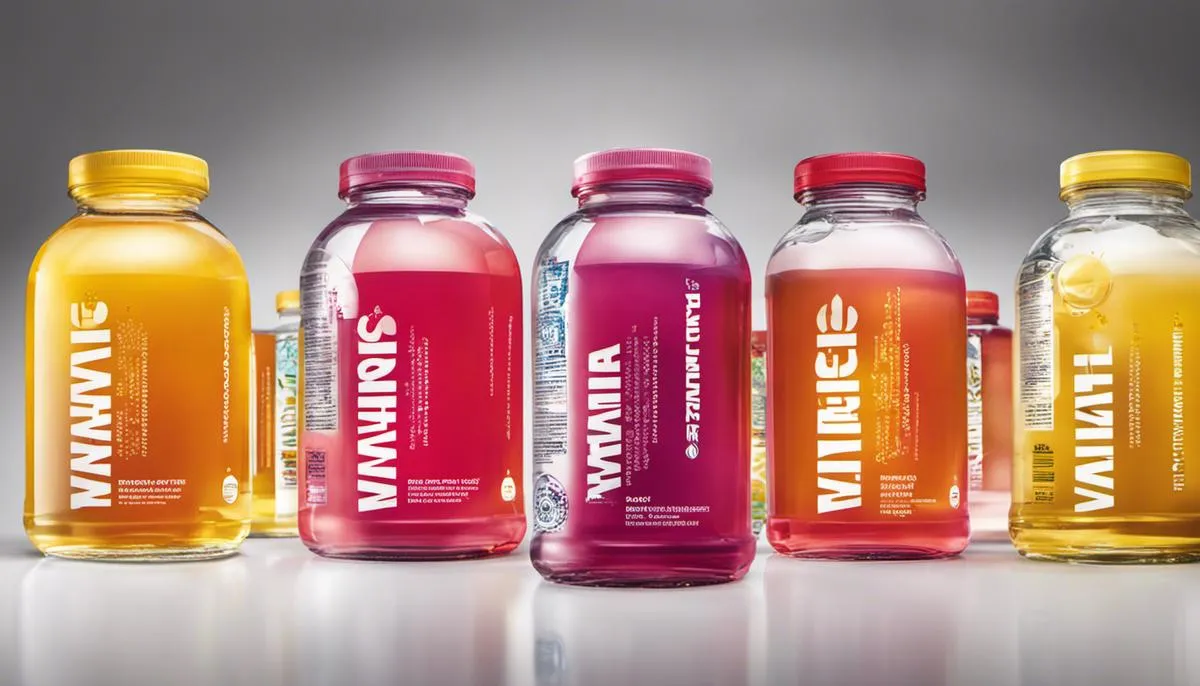
By delving into the intrinsic composition of Vitamin Water Energy, distinguishing its health benefits and possible side effects, and critically juxtaposing it against other energy drinks, we have unveiled an expansive understanding of this beverage. Coupled with an examination of consumer reactions and a detailed market analysis, this investigation unveiled the beverage’s value to its users and its potential for growth. As the demand for healthier energy-enhancing drinks soars, Vitamin Water Energy proves to be a promising contender in the market thanks to its blend of essential nutrients and its appealing taste. Therefore, it is incumbent upon consumers to make well-informed decisions based on comprehensible knowledge and factual information rather than mere hearsay and advertising hype, thereby ensuring their consumption habits align with their health and budgetary preferences.

